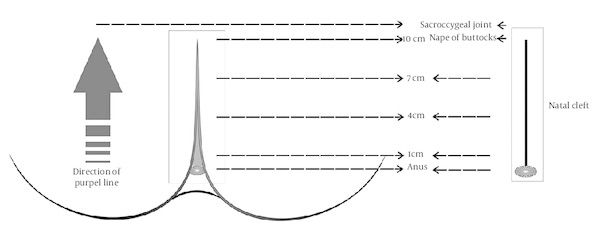Table of Contents
- One of the most remarkable ways in which our body tells you that you are dilating is the so-called Purple Line!
- It is a purple or brownish line (mostly depending on skin color) that extends from a woman’s anus upwards to the top of the cleft between her buttocks!
- To be precise, it does not appear in all women!
Accordingly, How can I tell if I am dilating? Try to insert the tips of your fingers into your cervix If one fingertip fits through your cervix, you’re considered one centimeter dilated If two fit, you’re two centimeters dilated If there’s additional space in the opening, try to estimate how many fingertips would fit to determine dilation
Can you dilate without contractions? Dilation and labor Contractions help the cervix dilate and efface from the beginning stages to the full 10 centimeters Still, you may be dilated slightly without noticeable contractions
How can I dilate faster? Getting up and moving around may help speed dilation by increasing blood flow Walking around the room, doing simple movements in bed or chair, or even changing positions may encourage dilation
Further, Can you dilate without losing mucus plug? Is it possible to dilate and not lose your mucus plug? You can dilate to a certain degree and not lose the mucus plug, but it will come out eventually All pregnant people will have a mucus plug protecting the uterus from bacteria It will always fall out before the baby is delivered
What helps to dilate faster?
Getting up and moving around may help speed dilation by increasing blood flow Walking around the room, doing simple movements in bed or chair, or even changing positions may encourage dilation
What week do you start dilating?
You generally start dilating in the ninth month of pregnancy as your due date gets closer The timing is different in every woman For some, dilation and effacement is a gradual process that can take weeks or even up to a month Others can dilate and efface overnight
Are there signs your water is about to break?
Signs of Water Breaking Others may feel dampness in their underwear that looks like they’ve peed or had a heavy vaginal discharge If you notice fluid leaking, use a pad to absorb some of it Look at it and smell it to distinguish between urine and amniotic fluid
Can you feel when you start to dilate?
#2: Backache and Menstrual Like Cramps As baby descends and applies pressure to the cervix, back pain can begin or worsen Early dilation often feels like menstrual cramps as the cervical changes cause pain and cramping noticed in the lower part of the uterus It is the same sensation and location as menstrual cramps
How can I dilate faster naturally?
Walking around the room, doing simple movements in bed or chair, or even changing positions may encourage dilation This is because the weight of the baby applies pressure to the cervix People may also find swaying or dancing to calming music effective






